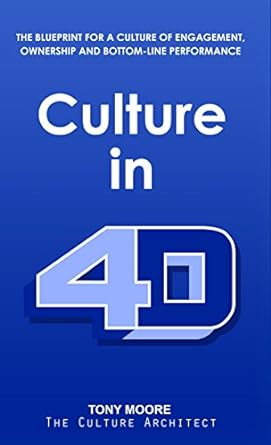
Culture in 4D: The Blueprint for a Culture of Engagement, Ownership, and Bottom-Line Performance - By Tony Moore
Date read: 2024-05-01How strongly I recommend it: 6/10
(See my list of 150+ books, for more.)
Go to the Amazon page for details and reviews.
Focuses on the importance of culture when it comes to building high-performing teams. Quick read that includes sample questions to help facilitate these topics with your team.
My Notes
In my experience, we are far too quick to identify an underperforming employee, incompetent manager, or poor system as the issue, when in fact the true culprit is embedded in the culture in which these individuals have been asked to operate.
Instead of being responsible for holding people accountable, I needed to be responsible for hiring employees who would hold themselves accountable. I needed a culture of ownership, not the rod of accountability.
The 4D System involves four phases:
- Dream It
- Design It
- Develop It
- Defend It
The Dream It phase is divided into two steps: (1) Naming It and (2) Making the Cut. At the conclusion of this phase, the team will have an agreed upon list of 3-5 words and/or phrases describing the kind of culture they desire.
Step One: Naming It - Naming It is a process where each member of the team identifies a list of words and/or phrases describing the kind of culture they desire. This list will be used to define the team culture.
Sample questions for facilitation:
- When you think about the best team you’ve ever been a part of, what word or phrase would you use to describe what made the team special?
- If someone observed every interaction we have with each other, what words would we want them to use to describe our team?
- If this was going to become the best team you have ever been a part of, what words or phrases would you use to describe the way we should relate to each other?
- What words or phrases best describe the kind of culture you need to be successful?
Step Two: Making the Cut
The next step is to cut the list down to a total of 3-5 words or phrases on which the team can agree.
Taking each value one at a time, ask each member of the team to write down three behaviors they believe best exemplify a value from the Dream It phase. If, for instance, respect is one of your values, each team member will identify three behaviors that demonstrate respect.
Now, working from the list of suggested behaviors, the next step is to pare the list down to a total of 1-3 behaviors on which the team can agree.
As someone once wrote, “If you want to build a ship, don’t drum up people to collect wood, and don’t assign them tasks and work, but rather teach them to long for the endless immensity of the sea.”
When the team makes a commitment to start something new, they are also making a commitment to give up something old.
Old habits do not die, they simply hibernate.
To embed these values in your team, you’ve got to flood the bucket. Don’t go into this thinking “who do I need to get rid of?” Instead, begin to create enough positive change that people will want to remain a part of it.
A former CEO once told me, "In matters of style, bend like a reed. In matters of character, stand like an oak."